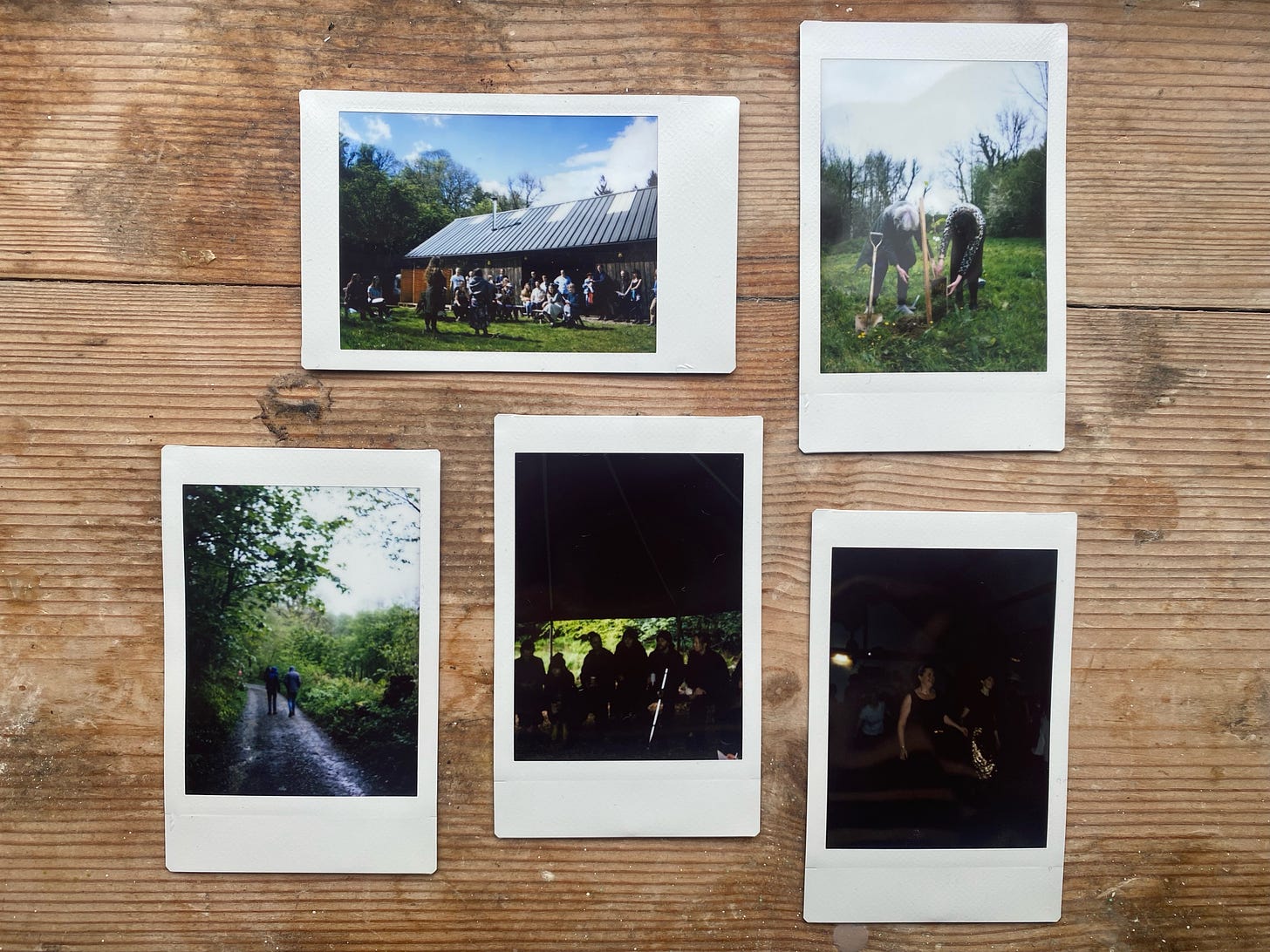Hi, friends,
I’m afraid I don’t have any thoughts on the female mystics for you this week, because I’ve spent the past week not studying and researching, but deep in ritual time. At the weekend, I gathered around fifty of the people I love most from around the world in a valley brimming with bluebells and winking with quartz boulders, near my home in southwest England. My fortieth birthday was an excuse, really. Mostly, we were there to celebrate the transformations and rebirths we’ve all been engaged in over the last five or so years of breakneck global change.
I feel changed on a cellular level (and also bone tired) after those few days, so this week, I’m offering a few probably scattered thoughts on ritual and why we need it.
In his book The Wisdom of the Sands, Antoine de Saint-Exupéry writes:
It is well that the years should not seem to wear us away and disperse us like a handful of sand; rather they should fulfil us. It is meet that Time should be a building-up.
Well. It’s hard to argue with that, no? So why is it the opposite of what we typically experience today? Why and how does the dominant culture continually reinforce the idea that the years will inevitably wear us away? Why does it cast ageing as a thing to dread and elderhood as a period of diminishment and dormant faculties, and consequently worship at the altar of youth?
In his book The Disappearance of Rituals, the philosopher and cultural theorist Byung-Chul Han convincingly argues that a major mechanism of this misconception about time is the loss of our rituals, which he defines as “symbolic techniques of making oneself at home in the world”. He writes:
[Rituals] transform being-in-the-world into a being-at-home. They turn the world into a reliable place. They are to time what a home is to space: they render time habitable. They even make it accessible, like a house. They structure time, furnish it.
When a culture has healthy, enduring rituals, Han writes, they come together repeatedly to perform symbolic acts that bind them together in community that does not require communication. “Things”—the material items that surround us—have endurance, because they are used in these symbolic acts and so become portals to ritual time. The experience of time and materiality is one of duration, even amid inevitable change.
But in modern, Western, post-industrial culture, we are symbol-poor, and “things” have no endurance. The material items that surround us are designed to break and become obsolete, to fuel further consumption. Instead of community without communication—which allows us to drop deep into ritual time—we have what Han describes as “communication without community”—and really, I can think of few better ways to describe our hyper-connected and yet somehow still atomized digital age.
And what’s the effect of all this? It leaves us all feeling contingent, like nothing so much as dandelion fluff. And when you’re dandelion fluff, it’s easy to slip into narcissism and self-absorption, as a misguided and desperate bid to get a foothold in the world.
I’ve believed all this on a theoretical level for years, but this week, I’m experiencing it in a newly embodied way. I don’t have any grand takeaways to share with you. In fact, I think it will take months or maybe years to fully metabolize what happened, and even then, I doubt I’ll be able to put words on it, beyond expressing my eternal gratitude to the wondrous humans who made it possible.
What I will say is this: my birthday is not some age-old cultural rite. There was no precedent or ritual history to our gathering. It was just an excuse. But even so, we came together and it mattered. It changed something, for me at the very least. And it did that through our species’ oldest forms of meaning-making and communion: through story (we walked through the Story of the Half-Girl over the course of the weekend; here’s the mythologist Michael Meade telling a slightly different version of that story). Through dance. Through singing. Through fire. Through breaking bread.
I’m sharing all this because what I think I’m learning is that even if your culture has lost its rituals, it’s not too late. It’s never too late. Because there’s nothing the human body knows better or wants more than to sing and dance and tell stories in community. And even after centuries of colonialism and industrialism and swelling materialism; even millennia after we lost our indigenous practices and started to conceive of time as linear rather than cyclical—even now, Time is right there, waiting for us to make our home in it, and start to move through life as a building-up, a fulfilment, a rooting; not a process of being scattered.
I hope to be back to Hildegard et al next week. For now, thank you for patience as I cross this threshold.
Love,
xx Ellie



Beautiful writing and thinking. You know, you might check out Abraham Joshua Heschel’s The Sabbath. He was writing about the architecture of time and the meaning of ritual a half-century before Byung-Chul Han.
I’m so pleased I’ve found your newsletter! Thank you for unpacking your thoughts on these complex yet fundamental topics. The idea that rituals make time accessible like a home has really resonated with me. As has your whole piece. Your writings about the imaginal realm make a profound sense for me, in understanding the limitations of our western scientific culture. I thought when I read many years ago about the Ancient Greek’s idea of time as chronos or kairos, that I was stumbling in the right area. But our conscious and unconscious (and all the states in between!) perception of time benefits from so much more enquiry. And I love how you go about that enquiry, thank you. It feels like I’ve been looking for a lot of the concepts you describe, for decades. I look forward to reading all your essays. Thank you 🙏